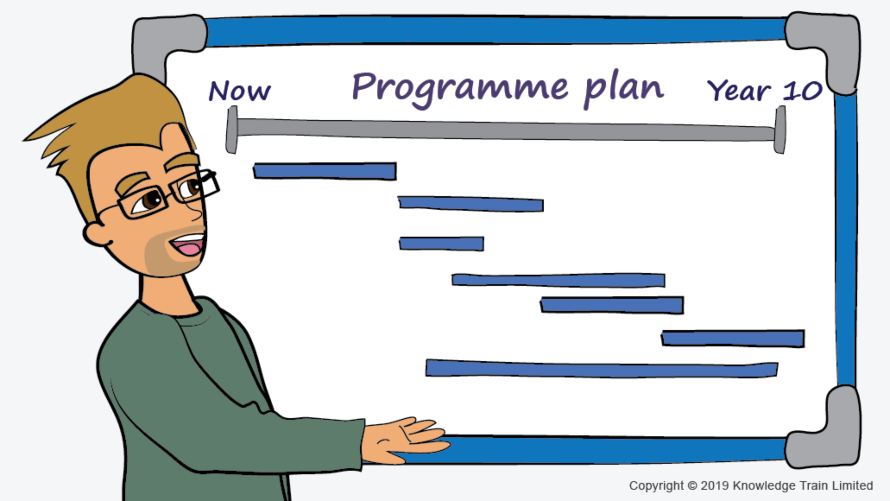
Introduction

What is Managing Successful Programmes (MSP)?
Managing Successful Programmes (MSP) is a best-practice program management framework. When an organisation undertakes a large, complex transformational change programme, Managing Successful Programmes enables it to break down the overall change into smaller, more manageable inter-related projects.
Managing Successful Programmes consists of a set of best practice principles and processes. The Managing Successful Programmes framework is flexible and can be tailored to meet different organisations’ needs. It is used in both public and private sector organisations.
Managing Successful Programmes is composed of:
- MSP official guidance;
- MSP certification – Foundation, Practitioner, Advanced Practitioner levels.
Managing Successful Programmes is owned by AXELOS – the joint venture between the UK government and Capita plc. MSP certifications are administered by the MSP exam institute (PeopleCert).
Well-known in the UK
In the UK, Managing Successful Programmes is the best-known programme management approach.
Managing Successful Programmes was developed by the UK Government in 1999 and has been used successfully ever since, both within the public and private sectors.
It gained much prominence when it was used to successfully direct and coordinate the London 2012 Olympic programme.
Why use Managing Successful Programmes?
There are many and varied drivers of organisational change. Technology, competition, legislation, and the environment are common factors which are driving organizations to change. Maintaining the status quo is no longer an option. Businesses which do not change will go out of business. Governments which fail to meet the expectations of their citizens will face their wrath.
Organisational change
The Managing Successful Programmes framework provides a structured best practice approach to implementing organisational change. MSP is complimentary to change management approaches which focus on ensuring staff within an organisation engage whilst undergoing a change programme.
Managing Successful Programmes is particularly well-suited to programmes which involve political and societal change.
For example, a programme to provide free pre-school education to children is likely to have low predictability in terms of its outcome. The benefits of such a programme might be that these people will make a more meaningful contribution to society after they turn adults. However, this is a long time into the future, and such outcomes are risky and hard to predict.
Specification-led programmes
There are also programmes which are more specification-led.
For example, large-scale engineering programme such as a city’s Olympic programme for the construction of stadiums and related infrastructure. These programmes are led by the specifications of the outputs.
Often on such programmes there is relatively little ambiguity about what the programme will deliver. However, this does not mean such programmes will be risk-free. They are often both risky and complex. On such programmes, Managing Successful Programmes can still be used but may need to be scaled down.
When to use MSP?
Managing Successful Programmes has been designed to accommodate high levels of complexity, ambiguity and risk. MSP is therefore highly suitable as a framework for transformational change. Managing Successful Programmes can be used to coordinate and plan across multiple projects.
If an organisation is simply delivering something new into its existing business as usual operational environment (e.g. developing a new product to bring to market) then the Managing Successful Programmes approach is not required. Instead a project management approach such as PRINCE2 will suffice.
If an organisation only wants to efficiently allocate resources to its different projects and to coordinate them, then Managing Successful Programmes is also not required. Instead, the organisation would benefit from a project management office.
Managing Successful Programmes framework
Managing Successful Programmes is based on three core program management concepts:
Principles
These are derived from lessons (both positive and negative) learned from previous programme experiences. They underpin the success of any transformational change.
Governance themes
Every organisation has different governance requirements. Governance themes allow the organisation to ensure the right leadership, delivery team, organization structures and controls are put in place, thereby giving the best chance for success.
Transformational flow
This describes the programme lifecycle which provides a route through the programme from conception through to the delivery of the new capability, outcomes and benefits.
Managing Successful Programmes certification
The demand for professionals with Managing Successful Programmes skills and MSP certification is growing. As more and more organisations invest in programmes to enable them to accomplish transformational changes, the demand for people holding Managing Successful Programmes certification will continue to grow.
If you are seeking to move into a programme management role, or are currently working in such a role, then having training in the principles and best practices of Managing Successful Programmes is vital to equip you with the skills and knowledge to help you to become effective in your role.
There are 3 levels of Managing Successful Programmes certification – Foundation, Practitioner, Advanced Practitioner.
Managing Successful Programmes Foundation
MSP Foundation certification confirms you understand the MSP guidance sufficiently to work effectively with those involved in the management of a programme or to act as an informed member of a programme office, business change team or project delivery team working within an environment supporting MSP.
The Foundation certification is a prerequisite for the MSP Practitioner certification.
Foundation training
You can gain the MSP Foundation certification by attending an MSP Foundation course and passing the 1-hour multiple-choice, closed-book MSP Foundation exam
Who is it for?
Attend this training if you are:
- A member of a Programme Office (PO); or,
- A business change team member; or,
- A project delivery team member; or,
- Anyone needing to understand the terminology and concepts underpinning MSP; or,
- Anyone wishing to pursue higher level certifications (e.g. programme managers, business change managers (BCMs) and senior responsible owners (SROs).
Managing Successful Programmes Practitioner
MSP Practitioner certification confirms you understand the MSP guidance sufficiently to apply it to your own work and can act as an informed member of a programme management team. This certification shows you can apply the MSP guidance in a relatively uncomplicated programme within an environment that uses MSP.
MSP Practitioner certification is a prerequisite of the MSP Advanced Practitioner certification.
Practitioner training
You can gain the MSP Practitioner certification by attending an MSP Practitioner course and passing the 2.5-hour multiple-choice, open-book MSP Practitioner exam. Many students gain their MSP Practitioner certification by attending a combined 5-day MSP Foundation and Practitioner course.
Who is it for?
Attend this training if you are:
- A project manager; or,
- A business change manager (BCM); or,
- A member of a Programme Office (PO); or,
- An expert or advisor working in a specialist/governance role involved in supporting programmes following the MSP guidance; or,
- Anyone wishing to pursue higher level certifications (e.g. programme managers and senior responsible owners (SROs); or,
- Anyone wanting to perform one of the above roles in future.
Managing Successful Programmes Advanced Practitioner
MSP Practitioner certification confirms you can lead and manage a programme of transformational change. In particular, it shows whether you can apply the MSP guidance in a complex programme within an environment that uses MSP. You must pass the MSP Advanced Practitioner exam is a 3-hour essay-style, open-book examination.
Who is it for?
Attend this training if you are:
- A senior responsible owner (SRO); or,
- A business change manager (BCM); or,
- A programme manager; or,
- Leaders or members of a Portfolio or Programme Office.
